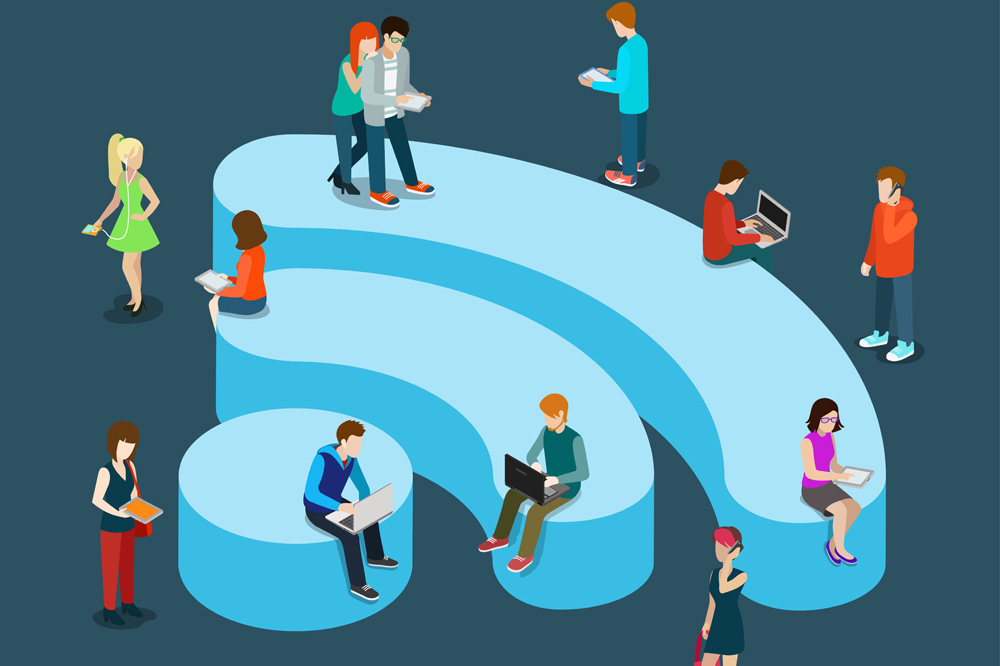iPass Inc. has revealed the results of the iPass Mobile Professional Report 2017. iPass surveyed more than 1,700 mobile professionals worldwide about their connectivity habits and preferences. It showed that people are addicted to Wi-Fi as part of their business and personal lives. They are also so dependent on their smartphones that they will break social etiquette to use them.
Key findings include:
- Nearly two thirds of people (62 percent) say that they feel anxious when not connected to Wi-Fi
- 7 percent admitted to checking their smartphone during sex, 72 percent from the toilet, and 11 percent during a funeral
- 61 percent of mobile professionals said that Wi-Fi was “impossible” or “very difficult” to give up – more than for sex (58 percent), junk food (42 percent), smoking (41 percent), alcohol (33 percent), or drugs (31 percent)
- A quarter of respondents (23 percent) would even choose Wi-Fi over other daily essentials such as a bath/shower, with 19 percent choosing it above human contact
- Because of this reliance on Wi-Fi, the average mobile professional connects to 8 public Wi-Fi hotspots each week. One fifth connect to Wi-Fi hotspots 20 times a week or more
- After cost and location, Wi-Fi is mobile professionals’ top priority when choosing a hotel – more so than the view or the food!
“You might expect to feel anxious before a first date or during a big presentation, but it seems that the simple prospect of not being connected to Wi-Fi is enough to set people on edge,” said Patricia Hume, chief commercial officer of iPass. “If there were any doubt, our report proves that social etiquette is a thing of the past when it comes to smartphone use. Technology, and particularly smartphones have become an integral part of our lives, so much so, that there’s no scenario in which people won’t check their phone. Moreover, they expect to be connected to Wi-Fi when they do it.”
“Mobile professionals also crave Wi-Fi and believe it harder to quit than even the most addictive habits, from smoking to junk food. They will use dozens of public Wi-Fi hotspots every month, and some would even choose it above basic hygiene or human contact. Clearly Wi-Fi increasingly influences how we work, our behavior and even the decisions we make, hotels being a great example. Getting a room with a view is no longer the be-all and end-all; mobile workers just want to be connected.”
Wi-Fi empowers a more productive workforce
Wi-Fi’s importance to productivity is the biggest reason why mobile workers feel so lost without it. Of those respondents who said they felt anxious without Wi-Fi, 31 percent said it was because they would find it more difficult to work remotely.
The report shows that mobile professionals use Wi-Fi and cellular data very differently. Whether due to mobile performance issues, data restrictions, or reliability, Wi-Fi is still the dominant force in connectivity, particularly for data-intensive tasks such as video conferencing. Ninety percent of mobile professionals say that they regularly stream audio/video content over Wi-Fi, vs. just 34 percent who do so over a cellular connection. Even lower-bandwidth internet tasks such as accessing cloud services and browsing the internet were roughly twice as popular over Wi-Fi.
This is not an isolated trend. There were several findings in the report that demonstrate the importance of Wi-Fi for mobile workforce productivity:
- More than half of mobile workers (58 percent) said that having no/poor Wi-Fi would negatively impact their ability to do their job in some capacity
- Half of respondents said that they want to be instantly connected to Wi-Fi on arrival at a hotel (50 percent), business meeting (53 percent), or airport (48 percent)
- However, more than two thirds (68 percent) said they have decided against using a Wi-Fi service, because the registration process was overly time consuming or frustrating
“Mobile professionals increasingly expect to be connected to Wi-Fi anywhere and everywhere,” continued Hume. “Wi-Fi is still unmatched in terms of its performance and reliability, and as an employer, it is your duty to understand this fact and to ensure your mobile workforce can connect to Wi-Fi easily and securely, wherever they are. The financial cost of unproductive and unhappy employees can be severe, and no business can afford to neglect the connectivity needs of its ever more mobile workforce.”




